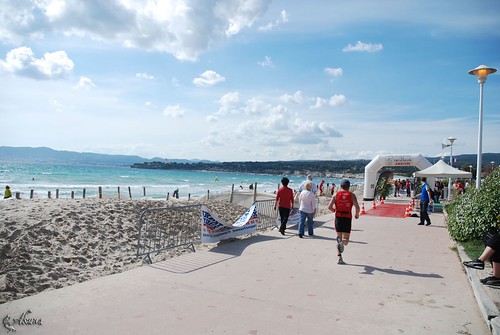Why We Don’t Plan a Fast Marathon Finish

![]() photo credit: akunamatata
photo credit: akunamatata
The following is an internal question from the Marathon Nation members forum, but since it prompted me to think a bit more deeply, I thought I’d share it with all of you.
“Hey Coach P, I finally got a chance to look at the marathon and HM pacing sheets you posted a little while ago. Those will be really helpful for prepping for races! I was a little confused about the marathon and half marathon paces though. It makes sense to start out slow for the first few miles then pick up the pace to get back to your target. I don’t get why in the HM sheet the last 3 miles are at the same pace as miles 4-10 and in the full the last 6 miles are actually 5 seconds slower than miles 6-20. I thought it was better to start out slow and gradually pick up the pace to try to run a negative split for the entire race? Your pace may slow down late in a marathon due to fatigue, but it seems odd to me that you would actually try to slow down your pace late in the race. The paces are right on and will get you to your goal time, but it just seems to me like the middle paces should maybe be a little slower and the last few miles a little faster. Thanks, Chris”
@Chris —
Another great question about marathon pacing! When I first wrote the pacing guidance for the marathon and half marathon distance into spreadsheets, I was very tempted to do just as you say. Start slow and finish fast.
I have learned over time, both personally and in coaching marathon runners, that the final “kick” miles are very individual. Smart pacing should set you up for a fast marathon finish, but there are more factors than just fitness when the hurt is on — factors that fall outside of what a spreadsheet can prognosticate.
Of course we all benefit from some form of finishing kick. Regardless of how hard we run during a race, and whether we are running the whole time or blow up and suffer in the middle, we all have something left for a kick at the finish. This has been proven in scientific studies and in reviews of world-class runners (here’s a great series over here on the Science of Sport Blog on this topic) from all distances — not just the marathon.
But knowing that kick is there and counting on it are two very different things. For most runners, controlling the pace when the going is easy is the most important thing. After all, we’ll hit some point on the day when your marathon pace drops and we’ll want to go faster…but we’ll have nothing in the tank. So the primary function of the marathon race execution resource is to keep you smart at the start.
The longer the race, the more difficult the latter miles become.
This is true even if you have been running within your ability / fitness levels. A half marathon is short enough that most folks can just blitz it and hang on for a speedy finish. So if you go out and exceed the pace of those final miles as written — GREAT — you’ll have gone even faster than you had hoped, and you deserve that time. I just wanted to avoid creating the expectation that a smart start guarantees a solid finish.
But if you prove me wrong, then we both win. 🙂
Happy Racing!

3 Responses to “Why We Don’t Plan a Fast Marathon Finish”